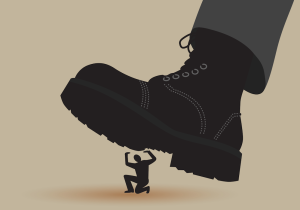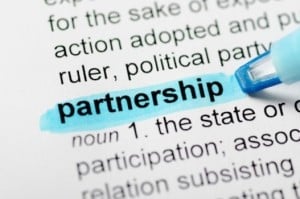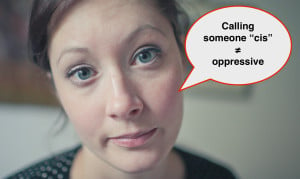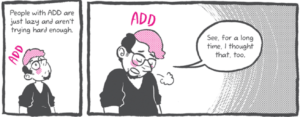
Child sitting with chin in hands with an adult behind them
“There’s something about you that’s very… blank,” a friend admitted to me a few years ago. “Like, you say everything in this emotionless way.”
It hadn’t always been like that.
I used to cry at cartoons because I loved getting so wrapped up in the story, it felt like it was my own. My parents told me to stop; it wasn’t real, after all.
When I told a teacher that kids in school were making fun of me, she said sticks and stones can break your bones, but words can’t hurt you.
When I refused to eat meat because I felt too bad for the animals, my parents told me that was just the circle of life, and I was being difficult.
When I told male friends that the underwear ads they salivated over harmed me as a woman, they slowly stopped talking to me.
When I got upset at my boyfriend for mocking the faces I made during sex in front of my friends, he said I was taking it too personally.
When I told a man hosting me in another country that he made me uncomfortable by saying he wanted to kiss me, he said I was sensitive.
The message was clear: If you show emotions, especially uncomfortable ones, others will be unhappy with you. They won’t be able to handle you. They may even abandon you.
So I shut up, and I shut down until there was nothing to shut up about.
Because traits labeled feminine are devalued in our society, we associate sensitivity with weakness. And the last thing anyone wants to be is weak.
When we tell kids (and adults) that they’re sensitive, it has lasting effects on their lives. I would know. Here are the effects it’s had on mine.
1. I Don’t Speak Up When I’m Hurt
When I have a problem with something someone says or does, my first thought is that maybe I’m the problem.
In middle school, for example, one of my classmates bullied me relentlessly. I didn’t tell my parents or a guidance counselor for months. I assumed it was my fault if she hurt me.
When it got to be too much for me and I did tell, people told me not to “let” her get under my skin because that was just what she wanted. I felt like more of a failure for remaining affected.
Ten years later, a friend made a comment that implied something insulting about me, bringing me to tears. I confronted her about it immediately afterward, but the next day I was apologizing for bringing it up.
Similarly, when a date touched me in ways I asked him not to, I told myself I was overanalyzing it. And when someone makes sexually inappropriate comments toward me, I still wonder if it’s really just a compliment.
These kinds of behaviors should never be minimized. And we shouldn’t be afraid to ask for help when they’re directed toward us.
An action’s wrongfulness is irrelevant to the victim’s sensitivity. Whether or not someone gets a bruise when you hit them, hitting them is wrong. And whether or not someone will cry when you’re mean to them, you should be nice.
Telling people they’re too sensitive can lead them to accept others’ abuse and then blame themselves for being abused. Healing requires knowing you were wronged and that the wrongdoing is the other person’s, not yours.
2. I’m Not Confident in My Moral Convictions
Some of the situations when I got called “too sensitive” were more political. I was deemed petty and emotional for caring about animal rights, paranoid for perceiving sexism on TV, and argumentative for calling out racism.
So, over the years, I learned to dump pretty much all my moral beliefs into one of three buckets: “tree-hugging hippie,” “angry feminist,” and “social justice warrior.”
I’ve learned to stay silent when people say problematic things. I’ve lied to myself and told myself I believe less “extreme” versions of my actual beliefs.
It was only after I found a community of people online who shared my beliefs that I began to feel safe owning them again.
I’ve realized that I never stopped believing animals are as valuable as humans. And that I don’t actually agree with the sexy, marketable version of feminism that says wearing lingerie is inherently empowering. And that no, I’m not willing to concede that there are “biological differences between men and women.”
If those thoughts make me extreme, I’d rather be extreme than be completely out of touch with the deeply felt sense of justice that makes me who I am.
3. I Have Trouble Getting Close to People
I used to always make comments like “I don’t love that many people” and “I just don’t understand those people who feel strongly about their friends.”
Then, the other day, I surprised myself by breaking down in front of a friend and telling her I was scared of losing her. Maybe, I realized, I did feel strongly about my friends. I was just afraid to acknowledge it.
When we get close to people, we become sensitive to them. We feel sad when they do. We feel anxious when they do. Their words and actions can break our hearts.
I’d learned over the years to suppress this sensitivity by keeping friends at arm’s length. But by doing so, I’d limited my ability to feel a genuine connection.
Learning that I really did love my friends was scary since it puts me in a vulnerable position. But because love is what I ultimately want, maybe it’s worth giving people the chance to hurt me. Maybe being sensitive to others serves a purpose.
4. I Don’t Advocate for My Needs in Relationships
I want more from my relationships than fun times and good sex and sweet gestures. I want life-changing conversations, shared tears, and emotional intimacy.
But I’ve been scared to admit that to my partners. I’m afraid I’ll come off too demanding. I’m afraid that if I let out my feelings around them, I’ll make them uncomfortable.
So I’ve put up with relationships that aren’t that meaningful. And I’ve put up with partners who fulfill my physical and intellectual needs, but not my emotional ones.
Yet despite the pressure many of us feel to keep relationships shallow and easy, it’s actually the tough, heartfelt conversations that make them stronger. Sensitivity is great for building bonds. Relationships can’t survive if partners are insensitive to each other.
Rather than conforming to the preferences of our less sensitive partners, sensitive people should have the chance to deepen their relationships, which benefits everyone.
5. I Ignore the Sense That Something’s Wrong
A few weeks ago, my boyfriend and I were planning a trip to a music festival. He advocated that we take a train that arrived there around midnight. I was hesitant to go out so late, but let him talk me into getting the tickets.
The next day, I started getting anxious. I just didn’t feel comfortable forcing my body to stay out for the entire night. So I told him I’d like to change our train reservations. And he told me I was overthinking it.
The night turned out awful. I headed back around 10 AM, feeling like a zombie and was exhausted for days. Why didn’t I listen to that intuition that this was a bad idea?
Because I assumed it was just my being too sensitive. I assumed my hesitation was just my anxiety acting up. I assumed that if I did start to experience discomfort, it would be in my head.
This kind of thing has happened many times before. I get a feeling something’s a bad idea, but then think, “That’s just you being you.”
Usually, though, these intuitions are right. And ignoring them can have more severe consequences than exhaustion.
A child, for example, may ignore an intuition that a sexually abusive adult is untrustworthy. Or a person with terrible menstrual cramps may ignore their intuition that the problem’s more serious than PMS.
Sensitivity to problems can prevent a lot of bad situations, so we should honor and listen to the foreboding feelings sensitive people get.
***
Being sensitive has its downsides, but the upsides are far greater. You gain a deeper knowledge of the world. You develop more fulfilling relationships. You live a rich, full life.
When I accept it and use it smartly, my sensitivity makes me more compassionate, intelligent, powerful, and wise.
Contrary to popular belief, it does not make me fragile. I’ve sustained all kinds of mistreatment and continued to kick ass. Like nerve-dense skin surrounding strong muscles and bones, I can take in the world and not be damaged by it. Sensitivity and weakness do not go hand in hand.
As far as I’m concerned, there’s no such thing as “too sensitive.” There’s only such thing as failing to take advantage of your sensitivity.
[do_widget id=’text-101′]
Suzannah Weiss is a Contributing Writer for Everyday Feminism. She is a New York-based writer whose work has appeared in The Washington Post, Salon, Seventeen, BuzzFeed, The Huffington Post, Bustle, and more. She holds degrees in Gender and Sexuality Studies, Modern Culture and Media, and Cognitive Neuroscience from Brown University. You can follow her on Twitter @suzannahweiss. Read her articles here.
Search our 3000+ articles!
Read our articles about:
Our online racial justice training
Used by hundreds of universities, non-profits, and businesses.
Click to learn more




















